
 |
For Immediate Release
Office of the Vice President
May 21, 2008
Vice President's Remarks at the United States Coast Guard Academy Commencement Ceremony
United States Coast Guard Academy
New London, Connecticut
11:33 A.M. EDT
THE VICE PRESIDENT: Well, thank you very much. Secretary Chertoff, Admiral Allen, Admiral Burhoe, Congressman Coble, Academy staff and faculty, distinguished guests, families, officers, cadets, and graduates:
I'm delighted to be with you today. In my final year as Vice President, it's an honor to visit this historic academy, to see the Corps of Cadets, and to meet the newest officers in the United States Coast Guard -- the Class of 2008.
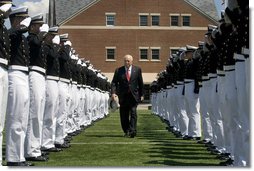 I can't help being a little jealous of the graduates and cadets here today.
After all, you'll still have a job eight months from now. (Laughter.)
I can't help being a little jealous of the graduates and cadets here today.
After all, you'll still have a job eight months from now. (Laughter.)
Once again, the faculty and staff of this Academy have prepared an extraordinary group of first-class cadets. Today's graduates include three international students, and we congratulate the diploma recipients from Thailand, Lithuania, and Tunisia. Throughout the corps we have hundreds of impressive, gifted men and women from all across America. There's even a fourth-class cadet who comes from the same place I do, Casper, Wyoming. I'm told he's on board the Eagle today, but he's the only cadet from my home state in the entire Academy. Then again, I guess it's never taken much manpower to defend Wyoming's coastline. (Laughter.) We've never let enemy vessels get beyond Idaho. (Laughter.)
Today more than 200 men and women will receive their shoulder boards and go forth from New London. As a group you've spent these last four years together, and Lord willing you'll come back many times more for reunions in the decades to come. But the 21st of May, 2008, will always be your day of days. We're all very proud of you. And it's my honor to bring greetings and congratulations to each one of you from the Commander in Chief, President George W. Bush.
The President sent me here with some instructions. Apparently some members of the Corps of Cadets are wrapping up their year on restriction. You know who you are. (Laughter.) Your Commander in Chief took note and thought we should give you a break. Me -- I could go either way. (Laughter.) But on behalf of the President, in honor of the Class of 2008, I hereby absolve the cadets on restriction for minor conduct violations. (Applause.) Now for the meaning of the word "minor," you'll have to check with Admiral Burhoe. (Laughter.)
Very soon you'll be reporting to Afloat Units, Sector Units, or Flight School. And as you sit here today, with two silver dollars in your pocket, I know that each one of you is focused on all the duties that lie ahead. It's fitting, as well, to reflect on all the hard work that brought you to this moment -- and to remember the people who stood beside you every step of the way. On this special day, no one is prouder than the people who know you best and care about you the most. And I think we should acknowledge them as well with a hearty round of applause for the parents of the Class of 2008. (Applause.)
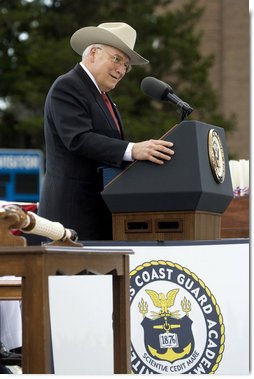 From this day forward, you will be America's lifesavers and guardians of
the sea. You'll be there to provide maritime safety -- from search and
rescue in moments of emergency, to the navigational aids that everyone on
the waters depends upon.
From this day forward, you will be America's lifesavers and guardians of
the sea. You'll be there to provide maritime safety -- from search and
rescue in moments of emergency, to the navigational aids that everyone on
the waters depends upon.
You'll be there to provide security -- to defend our maritime sovereignty, to honor the agreements we've signed with other countries, and to enforce this nation's laws against drugs and human smuggling.
And you'll be there for the work of stewardship -- to watch over the marine environment, guard its resources, and look after protected species and the waters in which they live.
It's an immense set of duties, as all of you well understand. The United States has 95,000 miles of coastline, well over 300 ports -- and we're active across more than 3 million square miles of ocean. The vessels in this domain -- from commercial tankers to pleasure craft -- are literally millions in number.
As officers, you'll be responsible for the safety of the ships and crews under your command, and for completing every mission that comes your way. And in your careers you'll be leading a Coast Guard that is more capable, agile, and well equipped than ever before in its 217-year history. The fleet includes multi-mission helicopters, sophisticated surveillance aircraft, response boats capable of righting themselves, and ships that can break ice four-and-a-half feet thick when the thermometer reads 50 below.
For all the duties we've given to this branch of the service, and for all the good work it carries out around the clock, it's amazing to realize that the U.S. Coast Guard is about the size of the New York City Police Department. Your heritage of incident response is a story of small numbers of men and women who can move swiftly and take control of a situation. Virtually every day, someone in your ranks goes to sleep knowing to a moral certainty that he or she has saved a fellow human being from death or serious injury. And every night, a lot of people are thanking God for the United States Coast Guard.
During your own time at this Academy, the Coast Guard distinguished itself when Hurricane Katrina swept in from the Gulf of Mexico. The following is a quote: "The Coast Guard successfully executed multiple primary missions throughout the Gulf Coast in the wake of the worst natural disaster in United States history. Responding with more than 4,500 personnel, 130 small boats, four cutters, and 60 aircraft to devastation and despair across more than 90,000 square miles and 6,400 miles of coastline, the Coast Guard rescued more than 33,000 people, began cleanup operations of 9.4 million gallons of oil, replaced and repaired over 1,800 aids to navigation, and provided hope to hundreds of thousands of displaced citizens. (Applause.) This inspiring response is a direct result of the spirit and practice of operational initiative, positive leadership and courage of the total Coast Guard force." End quote. Those are the words of the Presidential Unit Citation -- and the ribbon for that citation is proudly worn by every member of the Class of 2008.
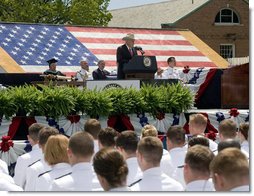 When you stepped forward to serve the United States, it was already clear
that these are decisive times in the life of our country. It's rare for an
Academy class to begin during a war, and then graduate during that same
war. The challenge that came to America on September 11th, 2001 will be
the defining issue of your career. As we confront deadly and determined
enemies and hold them to account, the Coast Guard will be essential to the
fight -- and the Coast Guard will be essential to victory.
When you stepped forward to serve the United States, it was already clear
that these are decisive times in the life of our country. It's rare for an
Academy class to begin during a war, and then graduate during that same
war. The challenge that came to America on September 11th, 2001 will be
the defining issue of your career. As we confront deadly and determined
enemies and hold them to account, the Coast Guard will be essential to the
fight -- and the Coast Guard will be essential to victory.
The extremists and killers who hit our country have declared, again and again, that they intend to come back at us. We take their words seriously. And we've responded with a comprehensive effort -- reorganizing the government to protect the homeland; expanding our ability to track enemy movements and communications; and bringing a global coalition to fight the war on terror. This nation has kept the commitment declared by President Bush after 9/11: to wage this battle on the offensive, to track the enemy down until he has no place left to hide, and to stay in the fight until the fight is won.
Five years ago, at the President's request, Congress created a new Department of Homeland Security, merging 22 different governmental organizations into a single department, with the overriding duty of protecting the American people from future attacks. The Coast Guard is the only military element of the Department of Homeland Security -- and its duties are at the very core of the homeland security mission.
In its five years as part of DHS, the Coast Guard has undertaken the largest commitment to port security operations since the Second World War. That alone is an enormous task, given the many foreign vessels that arrive at our ports every single day. On top of that, you're transforming our coastal defenses with better tracking technology, security zones around high-value assets, and many other steps critical to keeping the maritime domain free of terrorists.
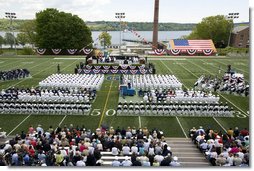 As you deploy the full range of assets close to home, the Coast Guard is
also vital to America's mission in Southwest Asia. As we meet today,
American Coast Guard personnel are providing port security,
on-and-off-loading of military hardware, and patrol forces to secure assets
in the Persian Gulf. They are serving, along with our soldiers, sailors,
airmen, and Marines, in part of the world that is going to require
America's close attention for many years to come. The Broader Middle East
is home to important values, to valued friends, and trading partners. Its
resources and commercial routes are at the very heart of the global
economy. Its history and its holy sites have deep meaning to hundreds of
millions of people in many countries. And the region has been a breeding
ground for the hateful ideologies that threaten the free world with
repeated acts of sudden, spectacular violence.
As you deploy the full range of assets close to home, the Coast Guard is
also vital to America's mission in Southwest Asia. As we meet today,
American Coast Guard personnel are providing port security,
on-and-off-loading of military hardware, and patrol forces to secure assets
in the Persian Gulf. They are serving, along with our soldiers, sailors,
airmen, and Marines, in part of the world that is going to require
America's close attention for many years to come. The Broader Middle East
is home to important values, to valued friends, and trading partners. Its
resources and commercial routes are at the very heart of the global
economy. Its history and its holy sites have deep meaning to hundreds of
millions of people in many countries. And the region has been a breeding
ground for the hateful ideologies that threaten the free world with
repeated acts of sudden, spectacular violence.
The war on terror is a lengthy enterprise, but it does not have to go on forever. To prevail in the long run, we will overcome the ideologies of hate by spreading human liberty, self-government, tolerance, mercy, and the dignity of every human life. The people of Iraq and Afghanistan suffered greatly through decades of tyranny. They want the same good things for their children that you and I want for our children. They've chosen the path of freedom and democracy. And no matter who lines up against them, they can know that America -- the country that liberated them -- still cares about their freedom. (Applause.)
I don't need to tell members of the armed forces that there is still a lot to be done on every front on this war. But we can take heart because American power is being used to serve American ideals. We are doing good things for the right reasons. Our new strategy in Iraq, with the surge operations that began more than a year ago, has succeeded brilliantly. And the only way to lose this fight is to quit. That would be irresponsible. More than that, quitting would be an act of betrayal and dishonor -- and it's not going to happen on our watch. Many times I've told the story -- (applause) -- many times I've told the story of visiting Iraq two months ago, speaking to several thousand of our troops at Balad Air Base, north of Baghdad. And I remember the strong response the troops gave one point in particular -- when I said we're going to get this job done right, so another generation of Americans doesn't have to go back and do it over again. (Applause.)
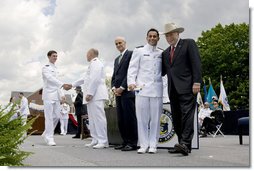 Officers and future officers of the Coast Guard: I am absolutely convinced
that we will succeed in the war on terror -- and I'm also convinced that it
will happen on your watch. Like most Americans, I stand in awe of the
people in our military. Having served as a White House chief of staff,
congressman, Secretary of Defense, and in my present job, I've had no
greater pleasure, no greater honor than working with those who wear the
uniform of the United States. (Applause.) My gratitude extends to your
loved ones, as well. Military service is a family commitment -- and this
nation can never give enough thanks to our military families. (Applause.)
Officers and future officers of the Coast Guard: I am absolutely convinced
that we will succeed in the war on terror -- and I'm also convinced that it
will happen on your watch. Like most Americans, I stand in awe of the
people in our military. Having served as a White House chief of staff,
congressman, Secretary of Defense, and in my present job, I've had no
greater pleasure, no greater honor than working with those who wear the
uniform of the United States. (Applause.) My gratitude extends to your
loved ones, as well. Military service is a family commitment -- and this
nation can never give enough thanks to our military families. (Applause.)
There's a saying in your line of work -- that the U.S. Coast Guard is the "hard nucleus about which the Navy forms in time of war." (Applause.) I'm not sure what the Navy thinks of that. (Laughter.) But for all Americans, when we think of the Coast Guard we think of the men and women who are always ready to save us from danger -- whether it comes from the furies of nature, or from the designs of evil men. This branch of the armed forces has given steady service to the United States of America since the year 1790 -- and in that time the Coast Guard has saved more than a million lives. As you step forward to accept new duties, your fellow citizens look up to you for the oath you take, the traditions you uphold, and the standards you live by.
On reporting-in day four years ago each one of you raised your right hand and took an oath. Today, at this ceremony, you will swear again to defend the Constitution of the United States against all enemies, foreign and domestic. I know you'll keep that oath, and I'm confident you'll live by the words of your class motto: "While we breathe, we shall defend." You've been trained, you've been drilled, you've been tested. You've lived by the honor concept. And you've proven yourselves worthy of the title of Coast Guard Ensign.
Today you're the same men and women you were four years ago -- only better. With you in the officer corps, it'll be the same Coast Guard -- only better. So this day of your commissioning is more than a memorable day in your own life -- it's a great day for the Coast Guard, and for the United States of America.
Good luck and Godspeed to the Class of 2008. Semper Paratus. Thank you all. (Applause.)